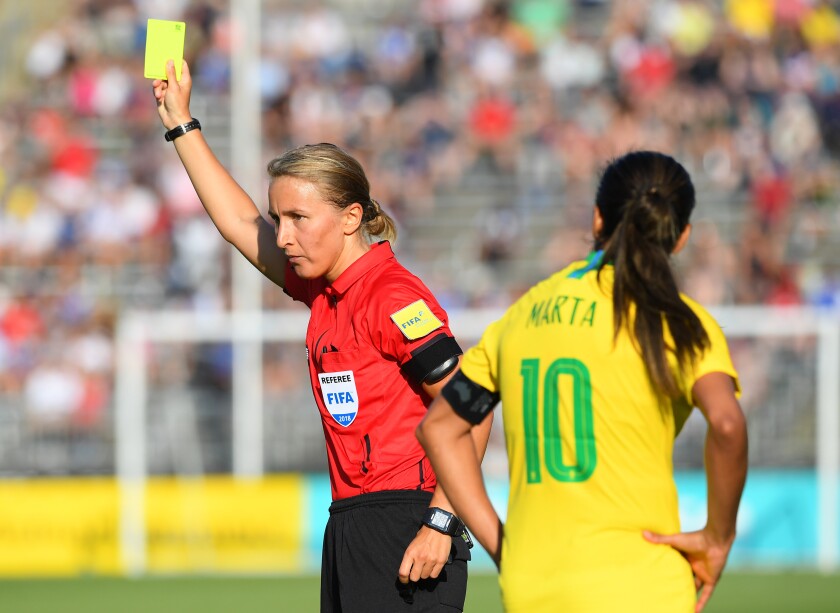Katja Koroleva has experienced more triumph and tragedy in the past 11 months than most people will see in a lifetime.
As a soccer referee, she worked five games in last summer’s Women’s World Cup in France, the ultimate reward from a game that has long consumed her. As a physician assistant, she has spent the last three months working 12-hour shifts in a hospital emergency room, battling death in the form of COVID-19.
The difference isn’t lost on Koroleva. Blow a call in a soccer match and someone gets a penalty kick. Make a mistake in the emergency room and. … well, she’d prefer not to think about it.
“It’s an important perspective,” she said. “Sports is an important part of our life. But life, ultimately, is the most important. There is no sport above life.”
Advertisement
Koroleva’s passion and her profession are unrelated, but there are subtle similarities.
“Many of the skills for an effective referee, including staying calm under pressure, managing stress, making decision[s] in difficult situations, I can only imagine would serve well for someone on the frontlines of the COVID-19 pandemic,” said Kari Seitz, FIFA’s senior manager of refereeing. “Never have those skill[s] been more important.”
Added Koroleva: “Neither field is really black or white. There are pathways we take based on gut instinct that are largely dependent on previous knowledge and understanding the situation.”
Advertisement
Koroleva watched the pandemic develop from inside the emergency room at Regional Medical Center in San Jose. During the early days of the virus’ rapid spread through Santa Clara County, the hours were long and the pace grueling, physically and emotionally.
“It was a very hectic time,” said Koroleva, who was caring for as many as 10 patients a day. “We opened a separate COVID area to separate patients with concerning symptoms. And there was a constant changing of requirements and guidelines by the [Centers for Disease Control and Prevention].”

Referee Katja Koroleva issues a yellow card to Brazil’s Raquel (not pictured) as teammate Marta reacts against Japan during the Tournament of Nations on July 29, 2018.
(Rich Barnes/Getty Images)
There was also a constant reliance on teamwork, another trait Koroleva learned first on a soccer field. In her five World Cup assignments, she was the fourth official — a vital if anonymous job that, if done correctly, takes pressure off the center referee and makes the whole officiating crew look good.
Advertisement
There is a similar selflessness in an emergency room.
“These qualities shine through,” said Felisha Mariscal, who officiated her first international match alongside Koroleva and worked with her in last summer’s Women’s World Cup as well. “She connects with people very easily.”
Koroleva, 33, was born in Russia, but her parents moved to Denmark, then Iowa, when she was growing up to give their only child better opportunities.
As a physician assistant, she performs many vital emergency-room tasks under the supervision of a doctor, diagnosing, treating and managing patients, ordering and interpreting tests, assisting in surgeries and writing prescriptions.
Advertisement
Koroleva earned a masters in medical science from Salus University near Philadelphia in 2011 and made her professional debut as a referee two years later. She has worked a number of major events, including a National Women’s Soccer League final, a U-17 Women’s World Cup, and the CONCACAF Women’s Olympic qualifying tournament this year.
But she hasn’t been on a soccer field since the SheBelieves Cup in Texas two months ago. When she returned to the hospital that weekend, she found an emergency room flooded with COVID-19 cases as well as anxious patients who had the common flu but feared it was the novel coronavirus. The workload dropped dramatically, she said, after Gov. Gavin Newsom ordered Californians to shelter in place and observe social-distancing guidelines.
Koroleva understands the desire to get back to normal; the lockdown has hurt her, too, by putting the soccer season on hold. But she fears health workers and first responders might pay for any impatience.
“It’s frustrating to see that we’re not united as a society to fight for the greater good against a pandemic that’s taking many lives,” she said. “It’s unfortunate that these protesters are risking lives of people on the frontlines including the police, government officials and even their own.”
Advertisement
She is heartened, though, by the support healthcare workers have received in the form of thank-you notes, media coverage and meals donated by community groups.
“It’s a surreal feeling,” she said. “… In the emergency department we certainly see patients all the time and have a life-changing aspect on their condition. So this isn’t a new perspective for us. It’s just a different enemy that we’re fighting that’s invisible and rapidly evolving and scary.”
Despite her trying circumstances, Koroleva tries to focus on the future.
Advertisement
“As a healthcare professional, it’s important to [have] optimism for our patients and for the next patient we see. Because it’s not just one patient, it’s the next and the next and the next.
“So for our own mental health, for the mental health of others, it’s important to have optimism.”
"right" - Google News
May 12, 2020 at 06:20AM
https://ift.tt/3fDNO40
Soccer referee helps make the right calls against the coronavirus - Los Angeles Times
"right" - Google News
https://ift.tt/32Okh02
Bagikan Berita Ini














0 Response to "Soccer referee helps make the right calls against the coronavirus - Los Angeles Times"
Post a Comment